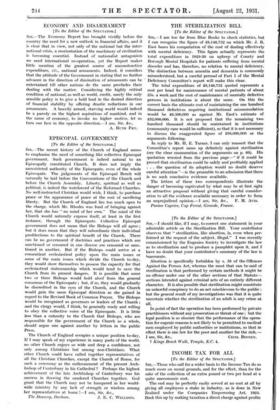EPISCOPAL GOVERNMENT
[To the Editor of the SPECTATOR.] SIR,—The recent history of the Church of England seems to emphasize the need of something like collective Episcopal government. Such government is indeed natural to an Episcopally constituted Church. It does not imply the unrestricted authority of the Episcopate, even of the whole Episcopate. The judgements of the Episcopal Bench will naturally be laid before the Convocations of the Church and before the Church Assembly. Liberty, spiritual as well as political, is indeed the watchword of the Reformed Churches. No well-instructed Christian would wish, I think, to purchase peace or the appearance of peace at the cost of sacrificing liberty. But the Church of England lies too much open to the charge, which Mr. Rhodes was fond of bringing against her, that she has " no mind of her own." The mind of the Church would naturally express itself, at least in the first instance, through the Episcopate. Collective Episcopal government does not mean that the Bishops will all agree ; but it does mean that they will subordinate their individual predilections to the spiritual benefit of the Church. There can be no government if doctrines and practices which are sanctioned or censured in one diocese are censured or sane.. tioned in another. But if the Bishops could arrive at a consentient ecclesiastical policy upon the main issues or some of the main issues which divide the Church to-day, they would show themselves to possess the capacity for that ecclesiastical statesmanship which would tend to save the Church from its present dangers. It is possible that some two or three Bishops would hold aloof from the general consensus of the Episcopate ; but, if so, they would gradually be discredited in the eyes of the Church, and the Church would gain the same Episcopal direction as she gained in regard •to the Revised Book of Common Prayer. The Bishops would be recognized as governors or leaders of the Church ; and the clergy would, I think, be generally ready and willing
to obey the collective voice of the Episcopate. It is little less than a calamity to the Church that Bishops, who are responsible for the government of the Church as a whole, should argue one against another by letters in the public Press.
The Church of England occupies a unique position to-day.
If I may speak of my experience in many parts of the world, no other Church enjoys so wide and deep a confidence, not only among Christians but among non-Christians. What other Church could have called together representatives of all the Christian Churches, except the Church of Rome, for such a ceremony as the enthronement of the present Arch- bishop of Canterbury in his Cathedral 2 Perhaps the highest achievement of the late Archbishop of Canterbury was his success in drawing the sundered Churches together. God grant that the Church may not be hampered in her world- wide ministry by any lack of strength or wisdom among, her representatives at home !—I am, Sir, &c.,






























 Previous page
Previous page